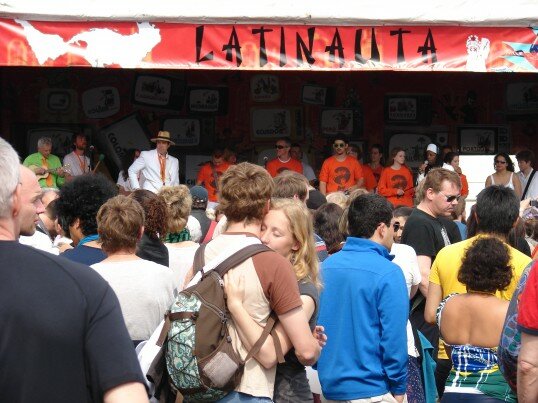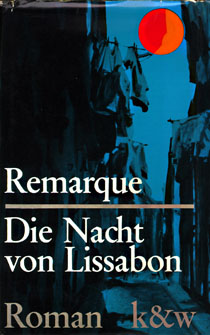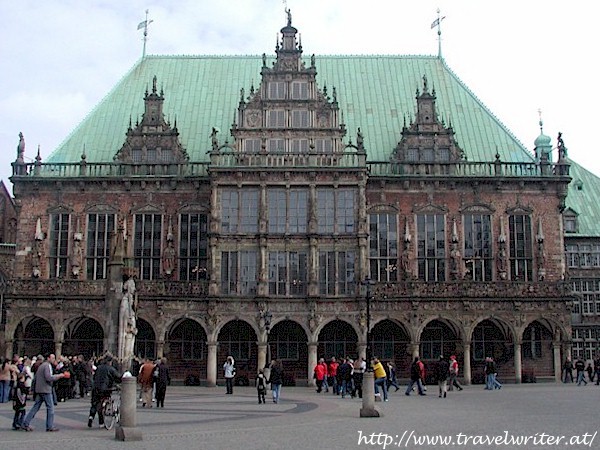A puppet writes in a book that he does not find himself in the new country. That he misses the taste of food. That he wishes to go back. That people don't understand him. That he needs to learn many new things.
Then he meets another puppet from his country (
paisan). They go to a bar where they meet more
paisans. A group of
paisans talk, complain that people in the new country are not
solidarish, that they do not value what they have and do not know how is like to live in social crisis, that they eat any junk shit. They share memories, books, get emotional together and talk about going back. Who dares to make the first step? And they dream about it. He says, I will go back, I need to reconnect with my roots.
- A paper plane flies from a place in the north to another in the south. In the new location, there are signs of joy, a welcome message, a handicraft or a mountain symbolizing the
Andes.
Second scene: Readaptation
Back in his country, he goes back to his neighbourhood, meets family and friends. The meeting is outside a convenience store. An old lady asks when he came back and how long he stays. She is angry, says it is fool to come back, that he should have stayed, that if she could she would go, but that she has to care for her family.
He goes to the store for beer, comes back with a glass, drinks beer with friends. Goes after to a restaurant with friends, is excited about the food, but the taste of food is not what he expected. He looks disappointed. He asks friends if the flavor has changed at the restaurant. They say, probably, that they use cheap ingredients now, due to the crisis. He is reflecting.
His friends laugh and make jokes, but he does not seem to understand, and ends up getting a bit upset. He says they are disrespectful.
He has changed and feels foreign in his own country. He writes that down in his notebook: the flavors have not changed, I have changed.
He thinks about leaving. He meets another puppet who came back like him. He introduces him to more puppets like him, expats in their own land. One of them tells him about a job abroad, an opportunity to leave again. He does not want to admit it, but ends up going for it.
He is at home, writes again in his notebook: this time I leave without pending issues. He says goodbye to friends and visits important places before leaving again. He takes a handicraft with him.
- A paper plane flies from south to north, this time to a farther place, looks even colder, white snow.
Third scene: Adaptation
He talks in a foreign language with work colleagues. They talk about girls, the ones that look hot, and they laugh. A girl passes by.
He speaks a language that is not his. A puppet invites him to a party at his place. Before, they go to the supermarket. He talks about “we” his friend talk about “I”. His friend grabs a basket for shopping and he thinks they will share it but they do not. He also says he has to go to the gym before the party. He is disappointed.
- A snake starts to suffer and changes it skin
Still, they have beers together before other people come to the party. Friends come and he runs out of beer. Another puppet notices that he does not have a beer and offers one, but he has to buy it. He is shocked. But all are having fun and he decides to buy the beer.
The next day he writes that being abroad is again difficult, not only the language but also the culture. But still, he prefers to avoid his country fellow men, he does not want to make the same mistake as the first time. He realizes that adapting will be difficult: I am not longer “we” it is “me” only.
His cultural resources are useless, his past lost sense, and he needs to change to be the same person. He needs to learn the new symbols so that people know he is a nice person.
Fourth scene: Overadaptation
- The snake suffers less and changes its skin almost entirely.
He is in his room, with his laptop, cigarettes, and wine. Someone knocks the door and asks for a cigarette. He sells it to him. His expression is rigid. He meets a friend at a bar. He orders a jar of beer and asks his friend if he will also get something. He then buys a six pack, goes to a party, and drinks the six pack all himself, while he talks and laughs with other puppets.
He meets a girl at the party, they talk, he shows interest, asks about what she does and avoids talking about himself. The next day they woke up at his place. A friend calls, he speaks in his language with total indifference to the girl. Then she asks for his number, but he says he has to go to work. She leaves discontented.
Next day he is writing and she calls. She says she got his number from a friend and hopes she is not being intrusive. He says, in fact, you are and that she should not have asked his number from someone else. He treats her like a stranger and hungs up. He thinks “maybe the snow is already mine”.
Fifth scene: Integration
He is at home with his handicraft, placed at a central place in his room. There is music, he is with friends, they drink wine and have fun. There are friends who speak his language and others that do not, all together. He feels confident and smiles. He has recovered his roots and learned how to live in the new land.
- You can see a snake with a completely new skin, not suffering.
He does not take anything seriously and makes jokes. At the party, he runs out of cigarettes, someone suggests he should buy one, but he does not give a fuck and takes it from him. The other puppet says that those are his cigarettes but he does not care and says that he should relax, that he will pay later. He does not. His friend also laughs. He sees no distinction in his behaviour with his country men and locals.
They keep drinking and only then becomes clear that it is his farewell party. He is leaving to another country. He gives a speech. He says he will miss his friends and a puppet gives him a handicraft from the local country.
He writes about how changing to be the same person worked. That finally he feels understood. That he adapted to the new codes, changed the forms, so that people understand his essence. That he is a happier person and that at the end, everything is pretty much the same. He writes also that he will miss the people of the foreign country, no longer foreign to him. He wonders if he will ever establish at one place and why he did not stay here.
Sixth scene: Isolation
- A paper plane goes from the north still further to the north. The south, the starting point can still be seen. The new place, although in the north, seems to be less cold.
At home, he keeps now two handicrafts, one from his country and another he got as present from the previous culture.
He plays the guitar with another friend in a foreign language, one that he is learning. They play, talk, and laugh. More friends arrive, they have a good time, and drink wine. Friends leave, he stays long time alone, looking constantly at his handicrafts, equally, with nostalgia.
Finally, he writes down. I feel happy here, I have made a group of friends, adapted to the lifestyle. But there is an empty space in the notebook, he cannot fill it in. The force of the past remains.
Final scene: The Dream
He is packing. He puts his two handicrafts and another one in his backpack. He has a map. He looks for the exit. All his things are packed. He smokes a cigarette while he looks carefully at the map, looking for the city exit. There are different options. He is confused, does not understand how to leave. He feels stressed, puts out the cigarette.
The phone rings. It is his friend to say goodbye. He is thankful. But his friend asks why he is leaving. He says he was offered a new job. His friend says that he still could stay if he wanted. He says he had a great time, liked the city, met amazing people, but it is time to leave. The puppet friend asks why. He does not understand the reasons. He says he already quit, he already rented the apartment at the other place, and that he is already going. His friend offers his place in case he wants to stay. He says he does not have to leave. He stays silent, his expression shows distress, confusion, and little by little despair. He is frightened, regrets his decision and thinks of his three handicrafts already packed.
He wakes up. He realizes is still at home, with his handicrafts unpacked, and that everything was a dream. He looks around and smiles. He looks at his notebook and tries to keep sleeping.
Berlin, January 24, 2006
 Recién vengo regresando del Carnaval de las Culturas en Berlín. Mis lectores saben que el carnaval es toda una tradición para mí desde que vivo en Alemania. He reportado ya varios carnavales pasados aquí (2007, 2008, 2010, 2011).
Recién vengo regresando del Carnaval de las Culturas en Berlín. Mis lectores saben que el carnaval es toda una tradición para mí desde que vivo en Alemania. He reportado ya varios carnavales pasados aquí (2007, 2008, 2010, 2011). 





